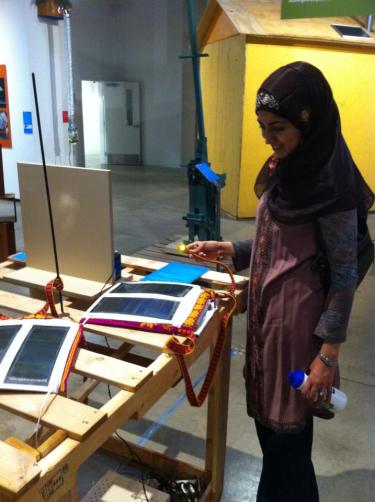 Taken second semester of the second year, the practicum is the culminating experience for Social Impact students. Past placements are listed below, along with student details.
Taken second semester of the second year, the practicum is the culminating experience for Social Impact students. Past placements are listed below, along with student details.
Elephant Energy
Social Impact student Joellen Radersdorf spent her practicum on the ground working to improve the quality of life for communities in Namibia, by pioneering ventures that provide access to appropriate sustainable energy technologies.
Zidisha
With a background in economics and a strong interest in social impact lending, Social Impact student Neil DiMuccio spent his practicum working with Zidisha, the first online peer-to-peer microlending community. On the ground in Kenya, Neil focused on usability and scalability of the microfinance mobile application.
Verizon
Social Impact student Mustafa Naseem worked on internet policy at Verizon headquarters, where he focused on accessibility policy.
World Bank
Social Impact Student Matthew Hulse spent his practicum at the World Bank aiding telecommunications, software infrastructure, energy, and technology-for-change initiatives.
International Telecommunications Union
Social Impact student Rachel Powers worked with the ITU to highlight the ICT opportunity for persons with disabilities.
Commonwealth Telecommunications Organisation
Social Impact student Rachel Strobel worked at the CTO focused on telecommunication policy and regulatory analysis as related to developing countries.
Broomfield Foundation
Social Impact student Isla Schanuel spent her practicum working with the foundation to aggregate a needs and services platform for Broomfield County. This resulted in a more usable and accessible system for goods and services to be matched with needs in the community.
Community of South Sudanese Women & Men
For his practicum semester, Social Impact student Chris Carruth designed and implemented a curriculum for participatory meida with the South Sudanese diaspora community. By using cameras to take images and upload those to editing software, participants were able to tell their stories, while also learning technical skills (both photo hardware and computer software).
EcoCycle
Working with local recycler Ecocycle, Social Impact student Lakshmi Haridas developed a planning tool for cities and countries to simulate a transition from traditional waste management practices to a zero-waste system – and that can do a cost-benefit analysis of such a transition.
ATLAS Institute
Social Impact student Luke Groeninger worked on a research with Dr. Sarah Sterling focused on mental health trauma, as part of a larger goal to examine how trauma may impact Social Impact intervention readiness.
Dar Si Hmad
Social Impact student Hawra Rabaan worked with Dar Si Hmad on mobile tracking via Frontline SMS for monitoring fog water harvesting in Morocco.
National Center for Women & IT
More than one student who have done their practicum with NCWIT has engaged in women in tech. Social Impact student Aaron Vimont focused him practicum on developing a narrative based computer game that would encourage STEM learning. Social Impact student Joey Lyon used geographical geographical mapping to help visualize NCWIT’s data to better serve participants in the STEM programs.
Burningman/Bitcoin
Social Impact student Scott Dudley spent his practicum researching developing economies and micro philanthropy communities.
ISET International
Social Impact Student Alexis Wagnon used social media to disseminate information and education to marginalized communities in Southeast Asia around climate disaster prevention and preparedness.
Mercy Corps
Social Impact student Cassianne Cladis worked with Mercy Corps on measurement and evaluation programs following the Ebola outbreak.
University of New Mexico Libraries
Social Impact student Mary Bowannie created a database to archive Native American oral histories.
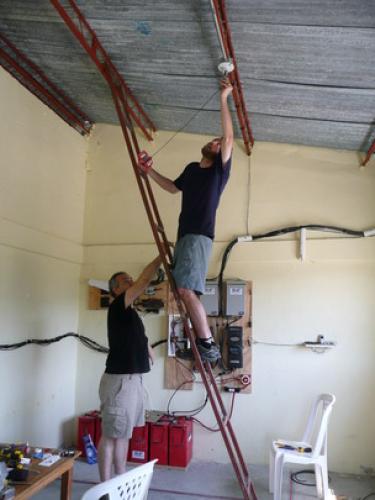 Refugee Services Office Workforce Development
Refugee Services Office Workforce Development
Social Impact student Dani Rodriguez spent her practicum focused on educational and vocational support and training to refugee families.
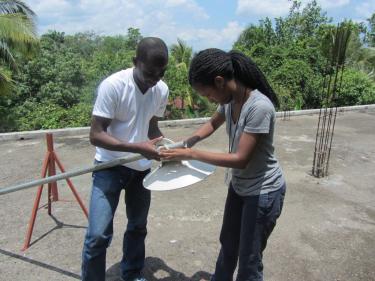 Green Wifi
Green Wifi
Social Impact student Kevin McElhinney created a free and open source Web-based solar photovoltaic monitoring platform to track solar input, usage and system health for Green Wifi, a nonprofit organization based in California that assembled solar powered long-distance WiFi networks to help close the gap between the digitally literate, and people who do not have access to digital educational materials. Formed in 2010, Green Wifi has successfully helped many people living in poverty to gain control of their education and gain access to the digital world. McElhinney's pilot site was in Laschobas, Haiti.
World Vision Haiti/Clinton Global Initiative – Curriculum Development for Teachers in Rural Haiti (Haiti)
World Vision Haiti is a global Christian relief, development and advocacy organisation committed to partnering with the people of Haiti to rebuild their lives today and to help enact sustainable solutions for the future of their children, families, and communities. World Vision’s child sponsorship program plays a vital role in this partnership. Alexandra Morgan-Kisarale together with Miami Dade College, developed customized 25-hour teacher training in Haitian Creole based on best practice frameworks, governmental standards, and a diagnostic assessment with teachers/directors. She provided oversight of training delivery and evaluation; and coordinated an embedded training-of-trainers to maximize the return on training dollars, build local capacity, and increase the likelihood of sustainability.
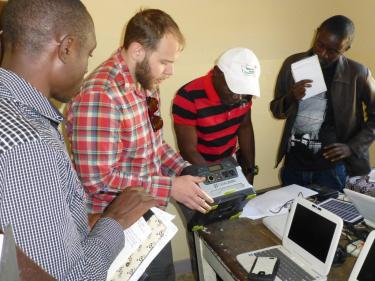 Inveneo – Hardware Solutions for Social Impact Projects Worldwide (San Francisco/Kenya)
Inveneo – Hardware Solutions for Social Impact Projects Worldwide (San Francisco/Kenya)
Inveneo delivers the tools of technology – sustainable computing and broadband – to those who need it most in the developing world, transforming lives through better education, healthcare, economic opportunities and faster emergency relief. Matt Crum worked with Inveneo on multiple hardware projects, including setting up communication in cooperation with Orange SA (telecom) in the world’s largest refugee camp in Dadaab, Kenya.
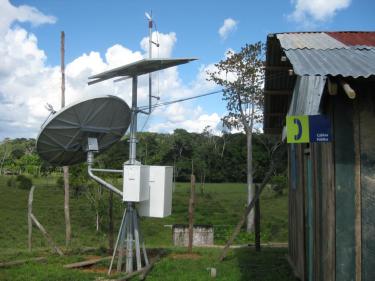 NapoNet – ICT Use in Amazonian Communities (Peru)
NapoNet – ICT Use in Amazonian Communities (Peru)
NapoNET designs ICT solutions for an existing internet backbone. Originally intended to fight malaria and dengue, and now the increasing threat of HIV/AIDs, the long-distance WiFi internet network (17 towers operating at 5.88 GHz, with ~2 Mbps of bandwidth for 120 hosts) serves primarily as a (VOIP) telephone system with Internet accessibility that connects 15 rural village health posts to regional hospitals. The network runs across 445 km of river from the border of Ecuador to the city of Iquitos (the largest city in the world unreachable by car) and serves a largely indigenous population of over 23,000. McClees Stephens conducted over 50 interviews with doctors, nurses, administrators, farmers, petroleum workers, government leaders, indigenous chiefs, regional research institutions, maintenance partners, economists & national telecommunications regulators, while travelling up and down the river in order to understand the role the communications system plays in social, environmental and economical issues in the region.
Iranian Epilepsy Foundation
Iranian Epilepsy Association is a national non-governmental organization whose mission is to increase public awareness & knowledge about epilepsy to enhance the quality of life for people with epilepsy through changing attitude toward epilepsy. Maryam Moghaddam-Zadeh spent two months in Tehran working as a consultant, helping the Iranian Epilepsy Association use technology for better communication with epilepsy patients, doctors, and the public. She helped establish an SMS messaging system to help communicate medical information to epilepsy patients in rural areas and/or affected by societal stigmas that often impact access to medical services/knowledge.
 Association for Craft Producers – Supply Chain of Fair-Trade Arts and Crafts (Nepal)
Association for Craft Producers – Supply Chain of Fair-Trade Arts and Crafts (Nepal)
The Association for Craft Producers (ACP) is a local, not for profit, fair trade organization providing design, marketing, management, and technical services to low-income Nepalese craft producers. ACP is a resource to advance and globally distribute their work, for which they receive fair wages and generous benefits. Nicole Stephan worked in and around Kathmandu with one of the largest production houses in Nepal, where fair trade native artisan crafts and art are sourced and created. She studied the supply chain, the partnerships with ACP and buyers around the world and attempted to streamline processes.



